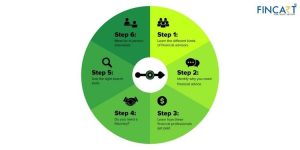Table of Contents
ToggleNew Year 2024 is here, and it brings with it the perfect opportunity to reflect on our financial aspirations and set the tone for the years ahead. If you find yourself yet to begin your financial planning journey, now is the perfect time to start. Your guide on this journey is your mindset. How positive or negative your mindset is will determine whether or not you reach your destination. Understand that wealth is not just about accumulating money but also about creating a positive and proactive mindset. It’s all about your attitude. Henry Ford once famously remarked, “Whether you think you can, or you think you can’t–you’re right.”
If you believe in yourself and think you can achieve your goals, you will. In this blog, we’ll understand how one can cultivate a wealthy mindset, and see its importance not just in terms of money but as a guide that can shape our approach to financial planning and decision-making. Let’s start the New Year with some positivity!
Reflect on the Past Year:
Think about the last year for a moment. Cherish the good and take lessons from the bad. Understand that even if your past wasn’t too good, you are here now. By simply reading this blog, you are taking proactive steps to improve, and that’s amazing! Mistakes can weigh heavy on your mind so it’s important to move on from past mistakes. But remember that it is equally important to learn from them. If you don’t learn from them, you’ll likely make them again. Every successful investment and every loss incurred will have its lesson to teach. Such experiences can help us grow and become a little wiser than we were before.
Define a Wealthy Mindset:
So what does it mean to have a wealthy mindset? Well, those who have a wealthy mindset approach their financial life with a positive outlook. They embrace gratitude and learn from their past successes and failures. They prioritise financial literacy and surround themselves with other positive people. They adopt an abundance mentality, which means viewing the world as a place where limitless opportunities and resources lie, and there is no scarcity. This mindset makes them confident and encourages them to seek solutions, take calculated risks, and believe in their ability to create and attract wealth. Such people are not just financially successful, but they are also a positive influence.
Cultivate Gratitude:
Now how can being thankful help in creating wealth? Being thankful can help in fostering a mindset of abundance. Start your day by expressing gratitude for the positive aspects of your life. This doesn’t just include your financial achievements, but also the little things in life. Transforming your mindset is a holistic approach, so consider everything. Try to maintain a journal where you jot down all the things you are thankful for in life. Write all the good that happened to you that day. Tell the people around you that you appreciate having them in your life. Such simple practices can shift your focus towards the positive and create a mindset that attracts wealth.
Set Clear Financial Goals:
If you want to turn your financial dreams into reality, start setting SMART financial goals. SMART stands for Specific, Measurable, Achievable, Relevant, and Time-bound. Let’s understand what a SMART financial goal is through an example. If you say, “My goal is to save a lot of money this year for a house.” you’re not being very clear. Instead, try to approach this differently. Say, “My goal is to save Rs. 20,000 each month this year and invest it so I can make a downpayment of Rs. 10 lakh in four years.” By saying this, you are being clear and specific. You can measure progress through savings goals. You are setting a specific period within which you can achieve your goal. It’s important to ensure that the goal is achievable too.
In the example above, an achievable goal relates to how much money you can save each month. Being unrealistic means you likely wouldn’t make much progress toward your goals, feel demotivated, and thus foster negativity. Break down your large financial goals into smaller goals so they are more manageable. This way you will also feel a sense of accomplishment when you achieve your small goals. SMART goal planning is the first step to realise your financial dreams.
Learn and Invest in Financial Education:
A great habit people with a wealthy mindset have is constant learning. They dedicate time and effort and enhance their financial knowledge through books, news, online courses, and podcasts. Try to understand the financial world by starting slowly. Read an article or two about any areas of finance that interest you in a week. Gradually increase this number and surround yourself with people who are fluent in finance. When you are empowered by financial literacy, you make informed decisions. An uninformed decision is unlikely to bear fruit.
For example, when you set out to do your investment planning, you have to be aware of the various kinds of asset classes, their returns, performance history, time horizon, tax implications, investing strategies, and much more. Jumping in without proper knowledge can expose you to financial risks and cause potential losses. The more you understand about personal finance, the more confident you will become in managing your wealth. Therefore, educate yourself continuously to build a solid foundation for your financial decisions.
Budgeting Tips for Financial Success:
Here are some tips that will help you with your budget planning –
- Get a full overview of your income, expenses, assets, and liabilities.
- Classify your expenses into three sections – Essential expenses, non-essential expenses, and savings.
- General guidelines state you should allocate 50% of your income to essential expenses, 30% to non-essential expenses, and you should save 20%. This is just a rule of thumb, however. Your budget allocation should reflect your short-term and long-term financial goals. For example, if your goal is to quickly build an emergency fund, your savings allocation could be higher.
- From the non-essential category, identify areas where you can make some cuts for additional savings. This could include unsubscribing from streaming services or not ordering food online as often.
- Be realistic about your budget. If you make too many cuts, your lifestyle will suffer and eventually, you will abandon your budget. If you want to stick to it, be realistic with your fund allocation.
- Stay disciplined and when you receive your monthly income, ensure that you save the money before you spend it.
- Monitor your budget regularly as your financial situation changes, and make adjustments accordingly.
Also Read: What is Budgeting in Financial Management?
Embrace Positive Affirmations:
Positive affirmations are little positive statements that one repeats to turn negativity into positivity. These affirmations build one’s self-confidence and motivate one to do better. For example, without a wealthy mindset, one might think, “I can’t ever pay off my debts so I will never fully achieve financial freedom.” Positive affirmations aim to change such negative thoughts. They turn the “I can’t” into “I can and I will.” With a wealthy mindset, one would say, ”I have a big debt that will take some time to pay off, but I will develop solid repayment strategies, consult an expert if I have to, but eventually I will pay them off and enjoy financial freedom.” Your mindset is what shapes your reality. If you think positively, you will act positively, which will in turn lead to positive results.
You should introduce positive affirmations into your daily routine to reinforce positive beliefs about money. Say phrases like “I attract prosperity effortlessly” or “I am financially empowered”, and gradually you will be able to reshape your subconscious and align it with your financial goals.
Surround Yourself with Positive Influences:
The company you keep also influences your mindset. Let’s take another example. Imagine a person who has trouble controlling himself when it comes to shopping. He will impulsively spend without thinking twice about the consequences. He starts to acknowledge this as a problem and tries to do better. Now his friend circle still pushes him to go shopping and spend without having any regard for the effort he is making to get better. Should he still associate with them?
Avoid people who feed your negative impulses, and hang around those who encourage you to do better. Surrounding yourself with people who share similar mindsets and aspirations can motivate and inspire you on your financial journey. Talk to them about their financial goals, and how they are planning to achieve them, and share experiences. When the going gets hard, uplift each other and persevere together.
Regularly Review and Adjust:
Building a wealthy mindset is a slow process. Just like you can’t kick a bad habit overnight, you can’t cultivate a good one either. Take one step at a time and do so consistently. Celebrate the small financial wins in life along the way to maintain your motivation. Be adaptable and adjust your financial plan when necessary. You will inevitably face setbacks, which will challenge your positive beliefs, so be prepared to meet them head-on. Acknowledge that building a positive mindset will take time and slowly, but surely, you will change your outlook.
Also Read: How To Plan Your Finances In New Year
Conclusion:
Having a wealthy mindset is much more than just about accumulating wealth. It is a journey of improvement and growth, and it is a continuous process. Success is a byproduct of a positive and proactive mindset. How you think is what guides your actions. Think positive and you will do positive. Take inspiration from those who exhibit this mentality and surround yourself with them. Remember that the path to financial success is marked by small, consistent steps. Set SMART goals, be thankful for what you have, seek financial knowledge, celebrate each accomplishment, and be adaptable in the face of challenges.
Let us conclude with these words from Albert Schweitzer –
“Success is not the key to happiness. Happiness is the key to success. If you love what you are doing, you will be successful.” So this the New Year, start cultivating a wealthy mindset, and let these words guide you on your journey towards financial prosperity!




